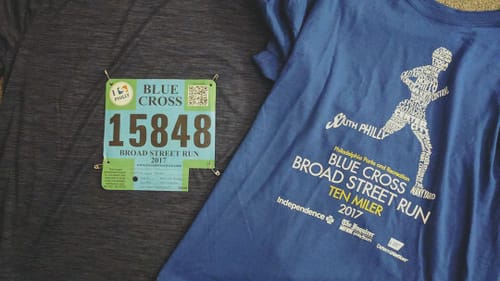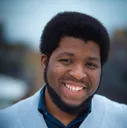Stay in the Loop
BSR publishes on a weekly schedule, with an email newsletter every Wednesday and Thursday morning. There’s no paywall, and subscribing is always free.
Surviving myself
Find me at the Broad Street Run

I was borderline homeless when I finished my first long-distance run in 2014. Prior to that, I had been governed by poor health decisions and didn’t know how to take care of myself. Where I come from, people laugh at you for taking care of yourself.
If you tell someone, “You shouldn’t be eating that, it’s bad for you,” the response that meets you is both immediate and viciously vulgar. Self-destruction is something to take pride in as a Black American male, making it the enemy that nests with you as if it’s your only ally.
The silence
I remain silent. I don’t tell anyone how to live their life. I struggle to speak my mind for more than a few seconds at a time. I’m vulgar against myself when I seek remedy, like I’m my own enemy. Assertive defense mechanisms dissemble as diversion from a problem I (and many others like me) am silently aware of, but too numbed and petrified to broach.
Still, I run.
Wrestling with silence is a means to unlearn self-destruction. Silence is a stigma that threads generations of Black Americans under blankets of oppression. Trauma is swallowed and buried. Tight lips are a signifier of strength. Treating yourself and others kindly, through words or actions, is an indication of weakness and puts a target on your head. Destruction from another is sure to come.
Around the way, it’s better to die by your own sword, not by someone else’s.
In other words, you ward off someone telling you to take better care of yourself with pleasantries like fuck you very much. Ignore their help. Shoot down their imparted, unsolicited wisdom. Die proudly as the warrior you are.
Still, I run.
Freedom
The 2019 Broad Street Run takes place this Sunday, May 5, and it’s an exciting time for me. Picking up my bib and checking out the new T-shirt design, feeling the buzz from others who will be running, laying low the Saturday before. The silent ritual of waking up to the crisp, cool spring air before sunrise on race day.
It’s riveting. It’s peace. It’s freedom.
And I hate running. My shins ache like needles drilling into them. My chest and shoulders tighten when it’s a colder run. I can never seem to hydrate properly and wind up with headaches after longer runs, no matter how pristine my recovery practices are. My mind tells me how stupid it is that I’m fucking running, and that I’m a stupid fucking idiot for doing something healthy. I can’t trust my own body. As if I need another reminder of how this body is always a target.
Still, I run.
The funny ones
Self-destruction is an uncomfortable thing to get candid about. When it’s brought to the table, I find that my Black friends who deal with it the most pad it with humor. The funniest people I know are also the ones I look out for the most. The ones I make sure I call regularly, the ones I go out of my way to visit, to the opposite side of the Schuylkill and beyond.
I’ve been told that I’m funny, too.
According to 2014 figures from the Centers for Disease Control and Prevention, suicide is the third leading cause of death for Black men ages 20 to 24. Black Americans are also about half as likely as their non-Black counterparts to seek treatment for mental-health issues, let alone have the financial facilities to afford doing so. Therapy is something I’ve long considered and something I advocate. I can’t pay for it, though.
So, I run.

Running home
In spring 2014, I met an editor who brought me on as a staff writer for the publication she’d founded. It was my first regular professional writing gig, five years removed from college. I’d been waiting for something like this for a while, dabbling around at countless jobs and gigs, few of which felt like home. This felt like home. My editor groomed me into a good journalist. And she invited me to my first half-marathon.
I’d never run more than three miles prior to that.
I trained for two months, in the heat of July and August—heat that reminded me of the self-destructive environment I thought I had run away from. There were more than 100 homicides in Philly that summer, and 2,421 black Americans died by suicide in the US in 2014. As a hyperempath—a term coined by one of my favorite authors, Octavia Butler—I feel that burden. I carry that burden. I understand that burden. I engage with that burden. Especially since I didn’t have a place to call home, the dissonance of my summer discomfort vibrated louder. Home is a feeling, and when displacement amalgamates with that and becomes synonymous, it’s hard to ever feel centered.
Still, I run.
Not for me
I completed the 13.1-mile 2014 Rock ‘n’ Roll Philadelphia Half-Marathon, something I never thought I could do. I found the other side of pain. The other side of self-destruction. I survived. The endorphins that rise after every run, that runner’s high, is gratifying. I love it. But it’s only a matter of time before I cycle back to where I was before.
I hate running because I feel like I survived. To survive elicits a sense of guilt: That I’m not going to die with this false sense of honor. That I’m overcoming my self-destructive behaviors. That I have more than other people who have disadvantages and disabilities.
My silence now is about wanting to listen rather than to manifest anecdotes of uplifting stories of how I “made it.” I’m making it, but I hope that when I do the things I don’t want to do for the sake of survival, that I can be a beacon for those who are on the precipice simultaneously of surviving themselves or destroying themselves. Oddly, both can feel the same, but only one keeps you alive and well.
I don’t run for me. I run against myself to accumulate a habit of tiny, endorphic victories. And maybe someday, I can pick someone up, just like my editor did for me, and help them find their freedom.
Still, I run.
To read BSR editor-in-chief Alaina Johns’s take on the Broad Street Run, click here.
Sign up for our newsletter
All of the week's new articles, all in one place. Sign up for the free weekly BSR newsletters, and don't miss a conversation.

 Kyle V. Hiller
Kyle V. Hiller